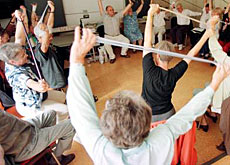Health fears raised over vitamin deficiency

A lobby group is stepping up pressure for increased consumption of vitamin B9 or folic acid in Switzerland.
According to campaigners, people are not getting enough in their diet to prevent spina bifida, cardiovascular problems, depression, Alzheimer’s disease and cancer.
They say babies are particularly at risk of being born with “open” spinal chords, known as spina bifida, if women do not double their intake of B9 during pregnancy.
“Around 70 per cent of all cases of spina bifida can be prevented through an adequate intake of folic acid,” states the lobby group, Folic Acid Offensive Switzerland.
Campaigners want the government to force Swiss bakers to add vitamin B9 to bread by adding cold-pressed wheatgerm to flour.
They are being backed by the Swiss Foundation for Consumer Protection, which has been running a letter campaign to pressure food suppliers into adding folic acid to their products.
Bakers rise
However, the consumer protection agency has met with plenty of resistance from bakers. It says the reaction from the industry has generally been “patronising”.
But the Federal Health Office says it is taking the bakers’ objections “very seriously”.
Michael Beer, head of the foodstuffs section, told swissinfo that the government was investigating the legal prerequisites for introducing such a measure, as well as looking at alternatives.
“It remains unknown what will come of the campaign to add folic acid to flour used in baking,” Beer added.
Beer, who personally considers the “Folic Acid Offensive” a good idea, said that once recommendations had been formulated by a committee of experts, they would then be put through a consultation process.
Daily dose
In Switzerland, the daily recommended dose of B9 is set at two milligrams – much less than in Germany (three milligrams) and the United States (four milligrams).
While pregnant women require double that amount (eight milligrams), Swiss people in general only have a consumption rate of 0.25 milligrams of folic acid daily.
This is despite the attention spina bifida received around ten years ago, when the Swiss skiing star, Maria Walliser, gave birth to a baby with an open spinal chord.
Walliser became the patron and driving force behind the campaign to increase the level of B9 in people’s diets.
She is backed by Professor Otmar Tönz, the former chief surgeon at Lucerne’s Children’s Hospital, who appears on the lobby group’s website to elaborate on the medical aspects of the disease.
“The formation of blood cells is the most sensitive part of the body to react to a lack of folic acid,” he points out. “Too little B9 can lead to anaemia [deficiency of red blood cells].”
Pregnancy fears
Tönz said that when women consume the correct level of B9 before and at the beginning of pregnancy, this helps the unborn child to develop a normal, healthy neural tube as well as a proper spinal chord.
Erich Meyer, co-founder of the B9 initiative, has already convinced some food producers and suppliers, such as Nestlé, and food retailers Coop and Migros, to offer products with an increased level of folic acid.
But Meyer, like his government counterpart, Beer, is still far from optimistic about increased folic acid content becoming the norm in Switzerland.
Critics have sought to fuel public fears by arguing that it may be possible to overdose on B9 – a claim refuted by Meyer as “unfounded”.
“The vitamin is water soluble, which means it can pass through people’s system quite normally,” he said.
swissinfo, Urs Maurer (translation: Tania Peitzker)
Folic acid is in the following foodstuffs:
Fennel, lettuce, tomatoes, radish, wholegrain bread, wheatgerm, cheese, yeast
Bananas, melon, kiwi fruit, avocado, peanuts and walnuts
Spina bifida is the malformation of the spinal chord at birth, including a lack of spinal marrow.
In the embryonic development of a foetus, a neural tube develops together with the spinal chord, the brain and the skull.

In compliance with the JTI standards
More: SWI swissinfo.ch certified by the Journalism Trust Initiative











You can find an overview of ongoing debates with our journalists here . Please join us!
If you want to start a conversation about a topic raised in this article or want to report factual errors, email us at english@swissinfo.ch.